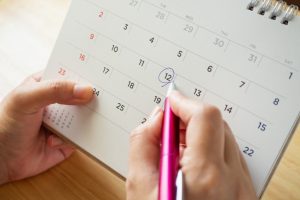One thing we commonly hear from patients is, ‘Oh, I wish I knew that when I first started trying!”’ because by the time patients seek fertility treatment, they’ve typically been trying to get pregnant for a while. Here are five things to know when you’re trying to conceive.
Put together by ORM Reproductive Endocrinologist Dr. Elizabeth Barbieri.
1. The prenatal vitamin is not going to help you get pregnant, but it’s not a bad idea to start taking it early.
A prenatal vitamin is a group of organic compounds that helps with your baby’s health & development, it’s not a medication that will increase your chances of getting pregnant. The critical building block in prenatal vitamins is folic acid. Folic acid can reduce certain birth defects of the brain and spinal cord by more than 70 percent. You want to start taking folic acid when you’re considering trying to get pregnant so that by the time you start, your folic acid levels are adequate.
2. If you have regular periods, then we know you’re ovulating.
Ovulation predictor kits can be helpful in tracking ovulation, but they are not always reliable. We often hear from patients who have regular periods that they’re using an ovulation predictor kit, and it never turns positive. They’re left thinking that they’re not ovulating. However, if you have regular periods, we know you’re ovulating. This simply means that your ovulation kit isn’t detecting your LH surge.
3. The best time to have sex is during the “fertile window,” which begins with the first day of your LH surge.
 The “fertile window” is the best time to try and conceive. We define this window as the period beginning with the day before you ovulate (defined by the first day of your LH surge), through ovulation, and the following day. We recommend that patients have intercourse over this period to increase their chances of success.
The “fertile window” is the best time to try and conceive. We define this window as the period beginning with the day before you ovulate (defined by the first day of your LH surge), through ovulation, and the following day. We recommend that patients have intercourse over this period to increase their chances of success.
How can we tell when you are ovulating? Like your period, the timing of ovulation can vary cycle-to-cycle. Ovulation is the release of an egg from your ovary into your fallopian tube. Once the egg is released, it survives for about 24 hours. If it’s not fertilized in that window, it disintegrates, you won’t become pregnant, and you’ll get your period.
From when you ovulate to when you get your period is about 14 days. To find the day you ovulate, look back at your cycles and count backward 14 days from the day you got your period. That’s the day you ovulated.
This means if you have a:
28-day cycle, you’re ovulating around day 14 and should have intercourse on days 13, 14, and 15
30-day cycle, you’re ovulating around day 16 and should have intercourse on days 15, 16, and 17
24-day cycle, you’re ovulating around day 10 and should have intercourse on days 9, 10, and 11
Checking for ovulation with ovulation predictor kits can be helpful to better define this “fertile window,” but sometimes, it can also be crazy-making. If you want to use an ovulation predictor kit, we recommend one like the Clear Blue Digital Ovulation Test, which we’ve found to be easier to read and understand.
4. Charting your temperature is not necessarily helpful and can drive you crazy.

Oftentimes, patients will bring in their temperature charts for the past two years, but that doesn’t help us figure out why they’re struggling to get pregnant. The temperature rise indicates that you ovulated. because progesterone, the hormone secreted after ovulation, affects the thermoregulatory center in your brain, causing your temperature to increase slightly. By tracking your temperature, the rise shows you you’ve ovulated, which means you should have had intercourse previously.
Tracking your temperature may be helpful to you in predicting when you ovulate since you’ll be most fertile during the two to three days before your temperature rises; however, there’s not much more that temperature charting indicates.
5. Basic lifestyle modifications can help optimize your body for fertility.
No smoking, no vaping, no cigars. No nothing.
Smoking is detrimental to both egg and sperm health. If you smoke on any level,
even if it’s social or once a month, stop.
No Marijuana
Consuming marijuana can also be detrimental to egg and sperm health. Stop.
Limit your alcohol intake to four drinks a week.
Data shows that drinking more than four drinks a week can affect the time it will take couples to get pregnant. This affects both partners and we advise both partners to abide by this restriction.
For women, no alcohol after ovulation until you get your period.
When you’re actively trying, once you’ve ovulated, it’s possible that you could be pregnant. We recommend abstaining from alcohol from the day you ovulate until you get your next period. If two weeks after ovulation, you get your period, you can have a drink.
Try to lead a generally healthy lifestyle.
Here are some key components of a healthy lifestyle:
 Eat a balanced diet with healthy foods
Eat a balanced diet with healthy foods- Healthy eating will not only improve egg and sperm quality, thereby improving fertility, it will also lead to a healthier pregnancy in women. Both men and women benefit from a Mediterranean-style diet.
- Maintain an optimal weight
- An elevated weight or BMI (normal 18.5-24.9) can reduce fertility in both men and women. For women, a BMI over 30 can increase the risk for ovulation disorders, pregnancy loss, and several pregnancy-related complications such as gestational diabetes and hypertension. In men, a BMI greater than 35 has been associated with low sperm count and motility.
- Exercise if possible
- Moderate exercise has been shown to improve both egg and sperm quality, and inactivity has a detrimental effect. Thirty (30) minutes of moderate exercise 5 days per week is recommended, as is strength training 2-3 times per week.
6. Know when you should seek infertility help.
Yes, number 6! We’re giving you a bonus one because it’s important. We’re here for you if and when you need us. So when should you seek fertility treatment? The technical definition of infertility for women under the age of 35 is 12 months of actively trying without a successful pregnancy. For women over 35 years old, because we know the impact of age on egg quality, infertility is defined as six months of actively trying with no success. It’s also important to note that not actively preventing pregnancy is considered actively trying, so if you’ve been sexually active without the use of birth control or contraception and haven’t experienced a pregnancy, we would regard that as part of your actively-trying timeline to determine infertility.
The first step in your fertility treatment journey is speaking with a reproductive physician. Schedule your consultation with an ORM physician today.
[button animation=”” variant=”1″ icon=”no” background=”#739d8b” color=”#ffffff” size=”small” target=”_blank” url=”https://ormfertility.com/lp/general-fertility/#schedule”]Schedule a Consultation[/button]




